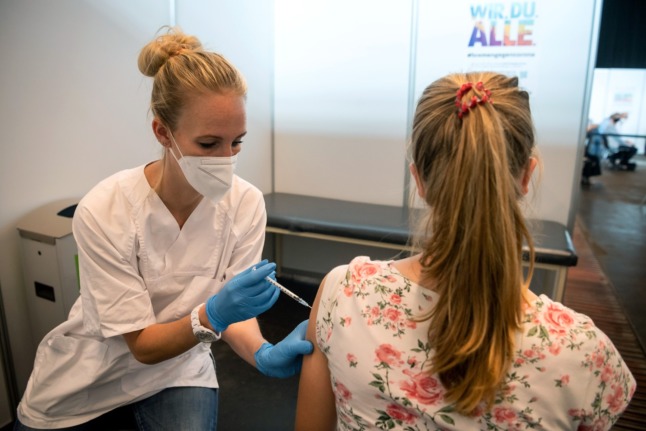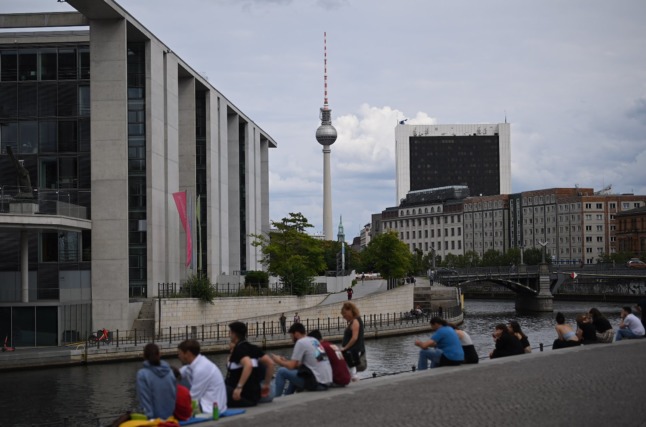With Germany seeing a surge in Covid cases, Merkel and the 16 federal state leaders will be discussing what action should be taken. And if – or when – tougher Covid rules should be brought in, and who they will apply to.
Politicians are divided on the question of whether or not unvaccinated people will have to accept more restrictions in the future, and what this will look like.
While a strict shutdown like the ones we’ve seen in the second and third Covid waves are unlikely due to the amount of people who are vaccinated, tougher measures could still be put in place.
READ ALSO: Germany considers tougher rules for the unvaccinated in autumn – but ‘drastic lockdown unlikely’
Merkel and the state premiers will also be thinking about how to get as many people vaccinated as possible.
When will restrictions be introduced?
Up to this point, German states and the government have been using the 7-day incidence of Covid infections per 100,000 to measure when to bring more rules in. For instance, the emergency brake measures – which included a curfew – were brought in when areas reached 100 Covid cases per 100,000 people.
But now that risk groups are protected through vaccination, authorities want to consider other factors for deciding measures such as hospital admissions.
The Tagesschau reported that one aim of the meeting will be to find a new assessment framework for the Covid situation that goes beyond incidence.
CSU state group leader Alexander Dobrindt said: “Incidence as the sole measure of all things has had its day.”
READ ALSO: Germany to focus more on hospital admissions when deciding measures
Will a nationwide ‘health pass’ be introduced?
People in Germany already need to show they are vaccinated, have recovered from Covid, or have tested negatively to do some things, such as going to the gym. But this varies depending on the region.
The so-called 3G rule, which stands for: geimpft (vaccinated) genesen (recovered) and getestet (tested), could be expanded in similar ways to other countries like France and Italy. That could see people need a ‘health pass’ to enter bars, cafes or tourist sites.
READ ALSO: Is Germany set to introduce a ‘health pass’?
Will Germany take a hard line against unvaccinated people?
Politicians on Tuesday will also discuss if 3G could turn into 2G if the Covid infection rate rises dramatically – that means that you would only be able to access some activities if you’re vaccinated or have recovered from Covid.
However, this point in the Health Ministry’s draft paper has proved particularly controversial already.
READ ALSO: Is Germany set to introduce a ‘health pass’?
North Rhine-Westphalia state premier Armin Laschet (CDU) made it clear that he rejects this move.
“Anyone who has been vaccinated, recovered or tested must not be excluded by the state from participating in social life,” the CDU/CSU candidate for chancellor told the Bild am Sonntag newspaper. The 3G rule is “sensible,” Laschet said.
However, Ralph Brinkhaus, chairman of the CDU/CSU parliamentary group in the Bundestag, said the rights of vaccinated people needed to be taken into consideration.
“What I’m experiencing at the moment is that the vaccinated are angry at the non-vaccinated,” said Brinkhaus. “The vaccinated made appointments, went out and put up with the fact that they didn’t feel so well the day after they got vaccinated. And they’re now experiencing that they still can’t fully get their freedoms back.”

He said he expects that hoteliers, clubs and event organisers will only allow vaccinated people into their establishments in the future.
Left-wing parliamentary group leader Dietmar Bartsch slammed the plans.
“The proposals from the Ministry of Health are poisoning the social climate and dividing the country,” he told the Redaktionsnetzwerk Deutschland (RND).
Instead, the federal government should push ahead with the vaccination campaign, bring vaccinations into people’s everyday lives in intelligent ways – “and not pave the way for a Covid-related two-class society,” Bartsch said.
An end to free rapid Covid tests?
The Health Ministry has also proposed charging people for Covid rapid tests in future once everyone has had the chance to get vaccinated.
This would have a huge impact for people who choose not to get vaccinated – because everyone needs to show a negative rapid test, or proof of vaccination/recovery, to take part in some aspects of public life – and this could become more common if the government decides to tighten those rules (as we mentioned above).
Getting rid of free tests also impact anyone – including vaccinated people – who uses the free tests before travelling abroad or monitoring their infection status.
There’s also a lot of disagreement on this topic which you can check out in our story:
READ ALSO: Germany divided over whether to charge people for Covid tests
What else will Merkel and state leaders discuss?
When looking at Germany’s Covid strategy for the colder months, politicians will also think about schools, how to keep the economy thriving and travel.
They may also look at economic support for businesses and freelancers, as well as the Kurzarbeit (reduced working hours) scheme.
Labour Minister Hubertus Heil recently said the scheme would be extended until the end of the year.
No ‘patchwork rules’ across states
Whatever happens on Tuesday, many in Germany have called for the states and federal government to agree a line together to avoid confusion and a patchwork of measures that are difficult to follow.
Districts need to be able to plan for the future, Chief Executive of the German Association of Towns and Municipalities, Gerd Landsberg, said.
“We must not start weaving new patchwork quilts,” he said.
Meanwhile the German Tourism Association urged the government to make sure there is no new lockdown.
In an open letter, tourist representatives said that now the majority of people in Germany had been vaccinated they wanted to see “reliable working conditions for our industry again.. instead of discussing restrictions on travelling again even when the level of infection is low”.



 Please whitelist us to continue reading.
Please whitelist us to continue reading.
Member comments